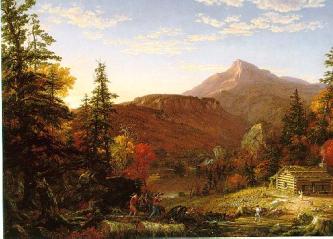
Thomas Cole's "The Hunter's Return"
See also: Ken Kifer on Bicycle Camping
The problem of what to take on a trip resolves itself chiefly into a question of transportation. If the party can travel by wagon, and intends to go into fixed camp, then almost anything can be carried along - trunks, chests, big wall tents and poles, cots, mattresses, pots and pans galore, camp stove, kerosene, mackintoshes and rubber boots, plentiful changes of clothing, books, folding bath-tubs - what you will. Such things are right and proper if you do not intend to move often from place to place. But in any case beware of impedimenta that will be forever in the way and seldom or ever used.
It is quite another matter to fit out a man or a party for wilderness travel. First, and above all, be plain in the woods. In a far way you are emulating those grim heroes of the past who made the white man's trails across this continent. We seek the woods to escape civilization for a time, and all that suggests it. Let us sometimes broil our venison on a sharpened stick and serve it on a sheet of bark. It tastes better. It gets us closer to Nature, and closer to the good old times when every American was considered "a man for a' that" if he proved it in a manful way. And there is pleasure in achieving creditable results by the simplest means. When you win your own way through the wilds with axe and rifle you win at the same time the imperturbability of a mind at ease with itself in any emergency by flood or field. Then you feel that you have red blood in your veins, and that it is good to be free and out of doors. It is one of the blessings of wilderness life that it shows us how few things we need in order to be perfectly happy.
Let me not be misunderstood as counseling anybody to "rough it" by sleeping on the bare ground and eating nothing but hardtack and bacon. Only a tenderfoot will parade a scorn of comfort and a taste for useless hardships. As Nessmuk says: "We do not go to the woods to rough it; we go to smooth it - we get it rough enough in town. But let us live the simple, natural life in the woods, and leave all frills behind."
An old campaigner is known by the simplicity and fitness of his equipment. He carries few "fixings," but every article has been well tested and it is the best that his purse can afford. He has learned by hard experience how steep are the mountain trails and how tangled the undergrowth and downwood in the primitive forest. He has learned, too, how to fashion on the spot many substitutes for "boughten" things that we consider necessary at home.